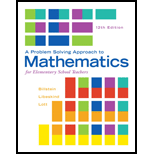
Concept explainers
Consider a game where you have two distict piles of objects.
Two players alternates moves, each player taking any number (not 0) of objects desired from a single pile.
The player who takes the last objects (so nothing is left in either pile) is the winner.
If there are a objects in one pile and b objects in the second, we write (a,b).
Given the game (1,1), the first player loses because if she takes 1 from a pile, the second player takes 1 from the other pile. Answer the following:
a. Show that the first player can win the game (1,2) as well as (1,100).
b. Who will win the game (1,a) if a>1? Why?
c. Which player will win the games (2,2), (3,3), (4,4)?
Why?
d. Which games can the first player always win? Why?
Want to see the full answer?
Check out a sample textbook solution
Chapter 1 Solutions
A Problem Solving Approach to Mathematics for Elementary School Teachers (12th Edition)
- Obtain the voltage across the capacitor for the following input: (a) 5Volts; (b) 3sin(t); (c) 2 cos(t). Use Laplace transform and Cramer's rule.arrow_forwardkofi makes a candle as a gift for his mom. The candle is a cube with a volume of 8/125 ft cubed. Kofi wants to paint each face of the candle exepct for the bottom. what is the area he will paint?arrow_forwardv(t) + R₁ = 1 ohm W R2 = 1 ohm www i1(t) 0000 L = 2H i2(t) C 1F + vc(t)arrow_forward
- Obtain the voltage across the capacitor for the following input: (a) 5Volts; (b) 3sin(t); (c) 2 cos(t). Use Laplace transform and Cramer's rule.arrow_forward1arrow_forwardFor communcation marks. In the questions answered above should have the criteria show proper mathematical form use proper symbols, notations, conventions, graph(s) where applicable solution is neat, clear and easy to follow If you write on the paper in online version you will be assigned 0 marks except graph.arrow_forward
- a) If is a polynomial function, does always have to have a horizontal asymptote? If no, provide a counterexample. ax+b b) Write an equation for a rational function whose graph of the formex+d where f(x) has all the indicated features. X-intercept of 14 Y-intercept of -1/2 VA with equation -2/3 HA with equation 4/3arrow_forwardPlease find the open intervals where the functions are concave upward or concave downward. Find any inflection points also thanks!Note: This is a practice problem!arrow_forwardAn airplane has a speed of 400 km/h with no wind. The airplane flies 2140 km with the wind. The airplane can only fly 1860 km against the wind in the same time. If w represents the speed of the wind, create an equation could be used to solve for w? Find the speed f the wind. hint; Use Time = Distance / speedarrow_forward
- x²+8x+15 f(x) = Consider the function. x²-x-12 a) Determine the following key features of the function: i) domain and range ii) intercepts iii) equations of any asymptotes and holes iv) intervals where the function is increasing and intervals where the function is decreasing v) Sketch the graph.arrow_forwardPls help ASAParrow_forwardPls help ASAParrow_forward
 College AlgebraAlgebraISBN:9781305115545Author:James Stewart, Lothar Redlin, Saleem WatsonPublisher:Cengage Learning
College AlgebraAlgebraISBN:9781305115545Author:James Stewart, Lothar Redlin, Saleem WatsonPublisher:Cengage Learning
 Algebra and Trigonometry (MindTap Course List)AlgebraISBN:9781305071742Author:James Stewart, Lothar Redlin, Saleem WatsonPublisher:Cengage Learning
Algebra and Trigonometry (MindTap Course List)AlgebraISBN:9781305071742Author:James Stewart, Lothar Redlin, Saleem WatsonPublisher:Cengage Learning Algebra: Structure And Method, Book 1AlgebraISBN:9780395977224Author:Richard G. Brown, Mary P. Dolciani, Robert H. Sorgenfrey, William L. ColePublisher:McDougal Littell
Algebra: Structure And Method, Book 1AlgebraISBN:9780395977224Author:Richard G. Brown, Mary P. Dolciani, Robert H. Sorgenfrey, William L. ColePublisher:McDougal Littell Glencoe Algebra 1, Student Edition, 9780079039897...AlgebraISBN:9780079039897Author:CarterPublisher:McGraw Hill
Glencoe Algebra 1, Student Edition, 9780079039897...AlgebraISBN:9780079039897Author:CarterPublisher:McGraw Hill Mathematics For Machine TechnologyAdvanced MathISBN:9781337798310Author:Peterson, John.Publisher:Cengage Learning,
Mathematics For Machine TechnologyAdvanced MathISBN:9781337798310Author:Peterson, John.Publisher:Cengage Learning,





